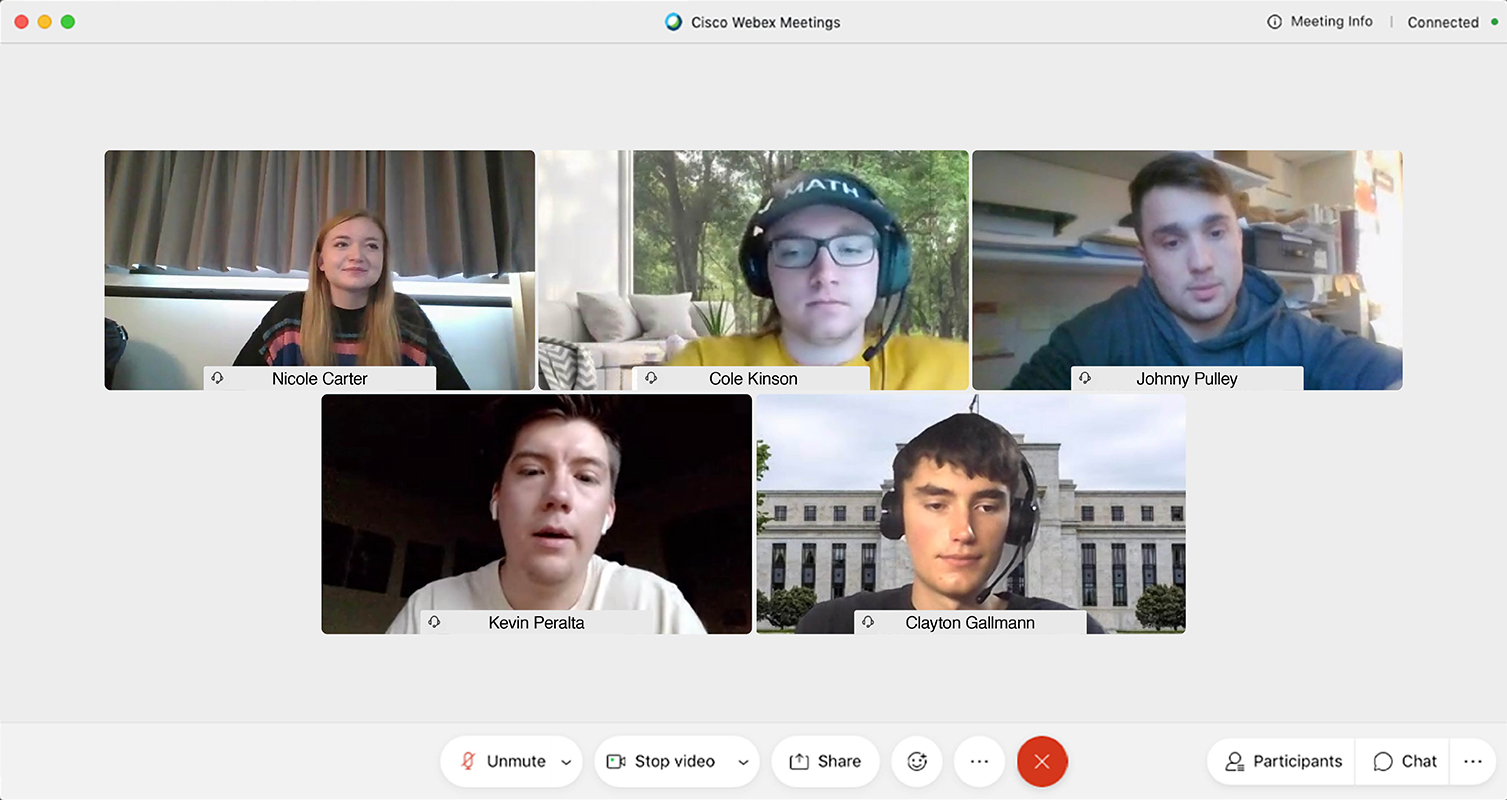UW-Whitewater defeats Northwestern University and University of Chicago to compete in Fed Challenge national semifinals
November 23, 2020
Written by Dana Krems | Photos by Craig Schreiner
For the second time in four years, the University of Wisconsin-Whitewater College Fed Challenge team excelled in regional competition and competed among the nation’s best economics programs.
UW-Whitewater prevailed against some of the strongest teams in the Midwest district — including Northwestern University, the University of Chicago and Marquette University — in order to advance to the national semifinal round. Final rankings were announced on Nov. 20, naming the top three teams as well as three other finalists. While UW-Whitewater was not included among the winners or national finalists, the students’ dedication and performance reflect highly on the university.
The 2020 UW-Whitewater College Fed Challenge Team included presenting members Nicole Carter from Cary, Ill., who is majoring in international studies and economics, Clayton Gallmann from Oshkosh, Wis., who is majoring in economics, Cole Kinson from Elkhorn, Wis., who is majoring in economics and mathematics, Kevin Peralta from Racine, Wis., who is majoring in economics, and Johnny Pulley from Stoughton, Wis., who is majoring in economics. Tyler Grissom from Cedarburg, Wis., who is majoring in international business and German, also contributed to the team’s success as a non-presenting member by providing significant research and analysis support.
In addition, economics faculty members Professor Yamin Ahmad, Associate Professor Eylem Ersal, Assistant Professor Krastina Dzhambova, Assistant Professor Narendra Regmi, and Professor Emeritus Stuart Glosser also devoted many hours as team coaches. They helped the team prepare and refine their presentation, and ran them through Q&A drills.
Co-sponsored by the Federal Reserve and Federal Reserve Banks, the College Fed Challenge is the preeminent economics educational competition that teaches students to think critically about the U.S. economy, financial markets and monetary policy.
“The competition requires a lot of research, and students get a feel for what macroeconomists do,” said Yamin Ahmad, professor of economics. “The team suggested a particular policy decision in the presentation video, and the Federal Reserve ended up taking that action a week later. So the students could see that they were on target with their analysis, and they were really excited.”
In past years, bracketed competitions led to district winners who advanced to the national round. This year, all teams in a district competed directly against each other with video presentations. The top three teams from each district advanced to the national semifinals, which featured a virtual question-and-answer session with judges. Team performances in the Q&A resulted in one finalist for each district, as well as the national first-, second- and third-place rankings.
“The team started preparing in March, at the start of the pandemic,” said Ahmad. “They met remotely every week from March into November, and their dedication and hard work were reflected in their performance. They went up against some very strong economics teams to make it to the national semifinals.”
Beyond economic acumen, analytical skills and presentation abilities, the College Fed Challenge requires strong teamwork skills.
“The students pulled together right away, and they excelled based on their ability to work as a team,” said Ahmad.
“The primary takeaway from my first year of being the team captain is how grateful I am that I was working with dedicated teammates and faculty advisors who cared about how well the team did,” said Cole Kinson. “As the competition grew nearer, it became more and more clear that we could never have advanced as far as we did without the effort put in by every single teammate, nor without the help we received from the faculty advisors. The project was just too large-scale to do without everyone’s combined effort.”
The Warhawks’ journey to the semifinals is particularly noteworthy during a year of unusual disruption. When announcing the winners, Chairman of the Federal Reserve, Jerome Powell, commended all participants on the talent and drive required of both students and faculty advisers to compete in this event during a time of so much upheaval.

